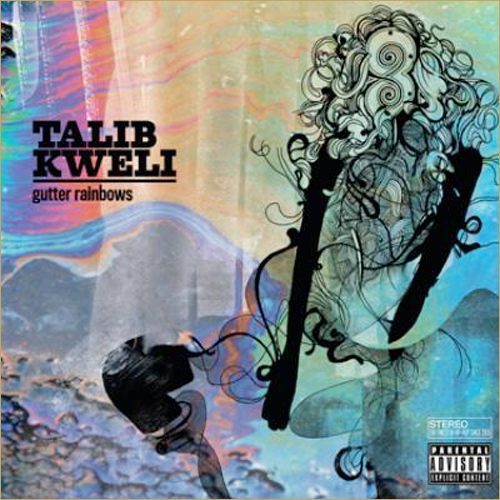Talib Kweli’s Gutter Rainbows was just one of those albums: in rap, hype inevitably builds so much around a record that it creates a perception of the album before release. Every word a rapper speaks about an album creates an opinion one way or another—just look at the reaction any time a Wu member says RZA won’t be producing their album. Following the disappointingly average Reflection Eternal reunion album Revolutions Per Minute, Kweli wanted to reach his fans directly, dropping a digital album. Recently that intention evolved into a CD release as well, but the intention remains the same: Talib is back to what he does best: hip hop freed of commercial pressure.
Talib makes good use of the opportunity. Rainbows both takes inspiration from Kweli’s childhood and represents the next step forward in the MC’s career. On that note, Kweli truly is just that here, an MC above all. Removed from major labels at last, the rapper was clearly able to make the songs he wanted, the way he wanted. That said, did he make the most of it?
The best answer is simply, yes. Rainbows may well be the best thing Kweli has done since Quality. On Revolutions and 2007’s Eardrum Kweli struggled to find a place amongst the slicker production he’d found was necessitated by the changing climate of the industry. He still put together those hard-hitting tracks, but played against his strengths with boasts and smooth cuts like “Midnight Hour.” Let’s put it this way: rather than spin game, Talib name drops Vonnegut’s Sirens of Titan.
That’s not to say Rainbows is perfect. In attempting to cleanse himself of big production, Talib sacrifices the benefits that often come with it. “I’m On One,” trying to capture the live experience, suffers from a loop of shouting that quickly grows irksome, regardless of the MC’s lyrics, which are more than on point. It’s preferable to a soft album, but one hopes that next time around Kweli will bring this energy to a bigger endeavor. Yet, that doesn’t take away from the small dignity of this record; it’s a strong effort that deserves a prominent place amongst a great MC’s work.
Like most rap “concept” albums, the concept is murky at best, Kweli’s childhood certainly influenced the childhood and some of the material, but its trail is largely lost alongside Talib shitting on pretty much everyone: current rap industry, the artists making hits within it, and his critics. Who’s complaining about that though? It’s easy to throw those stones, especially today, but Talib has a precise enough to make the shots hit. That’s the album in a nutshell: some production could have used fleshing out, but Kweli consistently carries you through it. Then there are the tracks that hit on all fronts, the sort that make you hope for a perfect Kweli album: with hard hitting beats and flows to equal them, “So Low” and “Tater Tot” are among the highlights here. Boasting an appearance from underground queen Jean Grae, “Uh Oh” is another contender, with a beat Dr. Dre in his prime would have nodded to.
Gradually, the backpack rapper has come to catch nearly as much flack as his mainstream counterparts, accused of preachiness and pretension. On Rainbows, Talib makes his feelings on the matter rather clear: “I’ve had it up to hear with the bullshit/ so when I rap I sound like I’m in the pulpit.” If you’re tired of hearing complaints about the current industry, this may not be the album for you, but if you consider yourself a lover of nineties rap, throw this one in ASAP – which young MC will be the next to gain the spot? With veterans spitting like this, it’s hard to care.

